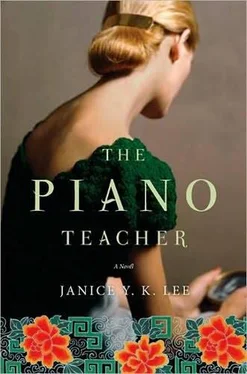Will sees a newsstand, for him a startling sight.
“I’d love a newspaper. How is the English broadsheet these days?”
“Run by a Swede under the careful watch of the Japanese,” says Dominick. “Result as you would expect. Piffle. I expect you’d like one.”
“I would,” Will says and takes the Standard and the News. Trudy pays.
“It is propaganda,” whispers Trudy. “They print whatever they’re told to.”
“Subtlety, my darling,” Dominick says, shushing her. Suddenly he relaxes and turns to Will. “So, how is it being on the outside?” They have exchanged only the barest of civil greetings. “And is it as atrocious on the inside as they say? Of course, the paper claims that you are being treated as if you were honored guests at the Ritz.”
“Certainly not ideal. But it seems rather fraught out here as well. Everyone tiptoeing around.”
“Is it true that Asbury is in there, doing his own wash like a common rickshaw boy?” A famously haughty banker, whom Will has indeed seen poking around in the dirt, trying to establish a garden, and hanging up his undershirts to dry, as his wife is abed most days.
“He is, but he’s holding his own. Surprising, the dignity that still holds in any circumstance.”
“Yes, we’re not our own men anymore, are we? ” Dominick looks around. “But some are more so than others.”
Will says nothing.
“It’s better to be a free person, though, isn’t it? ” asks Trudy. “We have to mind our manners out here but there’s no one telling us what to do or when to eat. Services are all getting back. Food prices were going up and down but they seem to have stabilized. We can withdraw small amounts of money. Public transport is working, as is the mail, in a way, and people are starting to settle, although it’s still a hard life. You do still run across the occasional corpse in the street, which is unpleasant. And the Japanese do work the coolies quite hard, harder than any Chinese I’ve seen, and they are having a hard time of it. They’re sending them back to China in droves as well. I think they aim to reduce the population by half.”
“Nothing is easy these days, is it? ” Dominick says. “Aaah, here’s the noodle shop.”
After lunch, Dominick goes to work, “such as it is,” he remarks, languid as always, and Trudy and Will go shopping. Trudy frequents the markets in search of treasures.
“I’ve seen things that I recognize from friends’ houses!”she says, rifling through a table of pilfered goods. “The ormolu clock from the Hos’, and that extraordinary dagger that was hanging above the mantel at the Chens’. I wanted to buy them but didn’t have enough money. Those,” her voice drops, “filthy rats just took away everything they could carry, and then the locals came after, and picked every house clean. Enough to make you weep, seeing those ships set out for Japan filled to the brim with all the lovely things our friends had collected. Cars and furniture and jewelry! Many a soldier’s wife is playing tea party with someone else’s Wedgwood these days.”
“Is there food we can buy so I could bring it back to camp?”
“Depends on the day and what they’ve been able to find. Sometimes there’s powdered milk, sometimes there’s crates of mustard. We’ll see.” She pauses. “It’s sort of freeing, this paring down to the necessities. It seems so frivolous to have thought about dresses and picnics.”
“You and Dominick seem to have your meals and lodging pretty well figured out.” He says this striving for a tone without judgment.
“Yes, we do,” she replies carelessly. “But it could all be taken away tomorrow so we must enjoy it while we can, no?”
She cuts down Pottinger Street and into a small alley.
“There’s a small shop here where you can get some amazing things.”
“What’s in demand?”
“Food, mostly. Some people have started speculating in gold and such. We’ll go to the market after this.”
A bell jingles as Trudy pushes open the door. Inside, it is dark and pungent with the smell of teakwood and the waxy oil used to polish it. A curio shop, with scratched, smudgy glass counters filled with Oriental peculiarities. Trudy speaks in Cantonese to the woman behind the counter, who scurries to the back, cloth slippers swishing on the floor.
“What are we looking for here? ”
“Oh, I’m just doing an errand for my master. You know.”
“How mysterious,” he says.
The woman comes back with a man, small, with a bent back, dressed in black silk. He seems irritated. Trudy speaks rapidly again, her small hands outlining a large rectangle in the air. The man shrugs and shakes his head. Trudy’s voice turns shrill. She ends with a sharp outburst and turns to leave.
Outside, the sun is shining, an abrupt change from the dark gloom of the shop.
“So, food?” he asks. She will tell him when she’s ready.
“Yes, food,” she says, taking his arm, an implicit gesture of thanks. “Sometimes, I think you could be Chinese too.”
***
The wet market seems the same as ever-wizened old ladies with wide-brimmed coolie hats, dressed in black smocks, bent over their wares, calling out to potential customers. Here, a basket of greens; there, soybean curds resting in a container of milky water, with yellow sprouts. He remembers the smell, the green, slightly brackish scent of dirt and water still clinging to the vegetables. He used to come with Trudy on weekends, her mother having told her that she was never to become too grand to go to the market for her own food. “At least, every once in a while,” she says. “Not all the time, of course. And you won’t catch anyone we know here. But I don’t mind. It’s kind of elemental, isn’t it? Deciding which exact onion you want, or what fish you’re going to eat and have them clean it for you.”
“How is it that there isn’t a shortage? ” he asks, as she bends over to inspect some radishes.
“There is, but these are available for exorbitant prices. All the peasants from the outlying territories make the trip into town now because they know they’ll get five or six times what they could get out there, so it’s all concentrated here. They come out with ten watermelons or a bag of watercress. It’s good for the soul to see how basic life can be. Grow something on the land, dig it up, sell it for some money, buy something you need.”
Afterward, when they have procured some tinned foods, vegetables, and cigarettes for Will to take back to Stanley, Trudy takes him for a drive around the Peak, to see all the bombed-out houses and ruined roads. Every wall is crumbling, bricks falling to the road.
“Can you believe what all the bombs did? They’re starting to rebuild, though. They have the slave labor or Volunteer Corps from China, as they call it, and they’re patching up the roads and trying to salvage the homes. Some have been taken over by Japanese military, and they look quite nice.”
They pass a house where some dozen coolies are painting the exterior white.
“The king of Thailand has an elephant that they trained to paint.”
“That is one of your outlandish stories.”
“No, I’m serious. Father said he saw it himself.”
“They had the elephant paint the palace? ”
“Certainly not! I’m sure he just painted the rough outbuildings and barns and things like that.”
“Of course, darling.” They’ve stopped at an overlook where tourists used to come to look over Hong Kong harbor.
“Should we get out? ”
There is a wobbly iron fence, pebbles and dirt underneath, wind with the metallic smell of lingering winter. She leans into him, hair blowing wild, as they look out onto the green sea, the white, stocky buildings crowding the shore and the harbor.
Читать дальше












